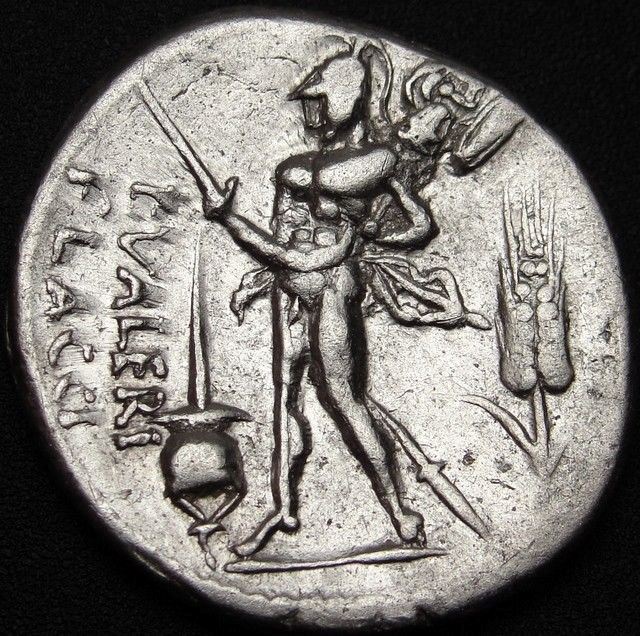Lucius Valerius Flaccus was one of the moneyers for the year 107-108 BC. He later served as Consul in 100 BC, and as princeps senatus (leader of the senate) during the 80s.
He is noted for his peace initiatives, which failed, and for sponsoring the Lex Valeria that created the dictatorship of Sulla.
Gens Gens Valeria was a patrician family at Rome, prominent from the very beginning of the Republic to the latest period of the Empire. Publius Valerius Poplicola was one of the consuls in 509 BC, the year that saw the overthrow of the Tarquins, and the members of his family were among the most celebrated statesmen and generals at the beginning of the Republic. Over the next ten centuries, few gentes produced as many distinguished men, and at every period the name of Valerius was constantly to be found in the lists of annual magistrates, and held in the highest honour.
He is noted for his peace initiatives, which failed, and for sponsoring the Lex Valeria that created the dictatorship of Sulla.
Gens Gens Valeria was a patrician family at Rome, prominent from the very beginning of the Republic to the latest period of the Empire. Publius Valerius Poplicola was one of the consuls in 509 BC, the year that saw the overthrow of the Tarquins, and the members of his family were among the most celebrated statesmen and generals at the beginning of the Republic. Over the next ten centuries, few gentes produced as many distinguished men, and at every period the name of Valerius was constantly to be found in the lists of annual magistrates, and held in the highest honour.

.jpg)
Obverse: Draped bust of Victory right; XVI monogram below chin
Reverse: Mars walking left, holding spear and carrying trophy over left shoulder; L•VALERI FLACCI and apex before; corn-ear behind
Diameter:
19 mm
Die Orientation: 2 H
Weight: 3.96 g
Die Orientation: 2 H
Weight: 3.96 g
There were at least seven notable Romans who were named Lucius Valerius Flaccus. Between 261 BC and 86 BC six of them held consulships; and one, the moneyer of this coin, went on to hold the censorship. The current Lucius Valerius Flaccus is apparently the son of the consul of the same name who held the position of Flamen Martialis, recalled by the figure of Mars together with the apex on the reverse of this coin. The Flamen Martialis was a high priest who oversaw the cult of Mars, the god of war. Duties included leading public rites on the days sacred to Mars. Like his father, this Lucius Valerius Flaccus also went on to hold the position of Flamen Martialis. In addition, this coin appears to record two other events connected with the Valeria gens: the successes of L. Valerius Flaccus in the north of Italy against the Gauls in 194 BC and the colonization of Placentia and Cremona by the triumvir of the same name in 190 BC, referred to by the corn-ear.
The M.J. Collection consisted of Roman Republican and Imperial coins and was formed in Portugal between the 1970's and 1990's. For a similar coin with matching dies see Hess Divo, Auction 317; Lot 566.
RSC Valeria 11; Crawford 306/1; Sear 183
